If you have children, you probably know how embarrassing it is to be you. I know I do.
Sometimes, though, I just can’t help myself.
Like on our last family vacation. We’d gathered in Bethany Beach, Delaware, where pretty much every beach-goer is either a lacrosse player, a bookworm, or (and yes, this does happen) both. Oceanfront real estate is dear, and by 9:00 a.m. every day, the good campsites have all been claimed by athletes and readers. Families stack themselves three and four deep, the ones in the back having to thread a course between chairs, towels, sports equipment, and a summer’s worth of New York Times Bestsellers just to get to the waves.
Got the picture? Good.
Because it was going on noon and the beach was super crowded when I finished Sara Hagerty’s new book, Unseen: The Gift of Being Hidden in a World that Loves to be Noticed.
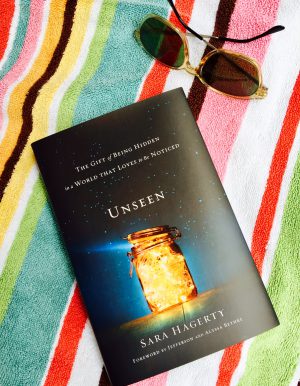
I’d started reading early that morning, taking my coffee and the book out to the sand.
I read about Sara’s post-college passion to “change the world for God,” and how her escalating effort to get the job done (and earn the approval of others) left her empty. I read about her career in sales and how, in the midst of client presentations and spreadsheets and co-workers who took credit for her work, she found herself craving more. I read about how, as a young mom, Sara tried to make a difference in her family amid piles of laundry, endless meal prep, and bickering kids in the backseat…and how, through it all, she scouted her days, trolling for the tiniest sign that what she was doing mattered.
I read about how God saw her in those hidden seasons, those hard-to-measure “middle minutes” of our lives. And I read how Sara saw Him, too. How she found herself drawn by His gentle expression. By his open stance. By the lines on His face.
The lines on God’s face.
Can you imagine? That image – that one little line, hinting at indescribable closeness with God – just undid me.
Fortunately, my kids didn’t notice the tears slipping out from behind my sunglasses, or the fact that (and I am not proud of this) I had to blow my nose into my beach towel. What they did see, however (and what pretty much everyone saw), was when I stood up.
As I said before, I couldn’t help myself. So captivated was I by the raw beauty of Sara’s writing that, when I finished the book, I had to let someone know. Thinking that I was only addressing my family, I held the book aloft (as in high, as in above my head) and said: “THIS is the BEST BOOK on the WHOLE BEACH.”
“Really?”
I turned, wondering who had spoken.
It was a lacrosse player seated one campsite over. He wasn’t reading, but his mom and his grandmom both had books in their laps. As did about 15 other beach-goers, who all now looked up, expectantly, to see what book was so good.
I had no choice. As my children buried their heads in their towels, trying to signal that they were not actually with me, I plowed ahead.
“Yes,” I replied. “Yes it is.”
“What’s it about?”
“It’s about…” and here I faltered. How do you tell someone that the best book on the beach is about how God has lines on his face? Or that it’s about how he sees you, and loves you, even in the most mundane and seemingly unproductive moments of your life? Or how he just…knows.
“It’s about God,” I finally said. “It’s about how we were actually made to be seen. And it’s…it’s just really good.”
“Okay,” said the lacrosse player. “I’ll check it out.”
I hope he did.
And I hope you will, too. Because I realize, reading back over this post, that I have not done a good job of explaining this book. Not at all.
Fortunately, Sara gave me permission to share an excerpt with you. And I’ll do that in just a sec, but first, you need to know two things.
Number One. Right now (as in, right now, cuz this promo ends tomorrow), Zondervan is offering a buy-one-get-one deal on copies of Unseen purchased at Barnes & Noble. Click here for details.
And Number Two. If you want a FREE copy of the book, post a comment on this blog. Tell me if you like Sara’s writing (I loved her first book, Every Bitter Thing is Sweet), or maybe what you’ve done lately to embarrass your kids. Or just say hello; anyone who comments will be entered to win (and I love this book so much that I’ll actually pick two winners, so your odds just went up). This giveaway will be live through 9/21, so jump on it.
Here’s Sara:
“Why this waste?”
(excerpted from Unseen: The Gift of Being Hidden in a World that Loves to Be Noticed)
I’d been in a suit and heels since 5:00 a.m., and after a full morning, I was at the airport for an early afternoon flight home—home to a husband, but no children.
I’d recently started to crave more. I wanted more from my sales support job. I wasn’t tired of doing it or even tired of the desk work and the travel, but I was tired of working for little more than sales goals and a paycheck. I wanted more than productivity and success. I wanted brushes with God and meaning and almost anything that mattered but wasn’t easily measured.
My work for the day was done and I was tired, but my heart was hungry, and I was beginning to like heart hunger. So I prayed: God, I want to meet with You in this airport.
Meeting Him required quieting my insides enough to hear and respond. The kind of dialogue I was learning to have with God burgeoned when I saw it as an exchange—my mind for His thoughts, my fear for His assurance, my whispers for His response. As I made my way to a restaurant near my gate, I noticed an elderly gentleman who was being pushed in a wheelchair. I prayed for God to breathe life and strength into his frail body. I saw a man running as fast as my mind usually worked, and I prayed his racing heart would come to know Jesus. I saw a young woman with vacant eyes, and I prayed she would find the filling her heart most needed. I realized afresh that the people all around me weren’t merely interesting. They were God-created. I wanted to talk to Him about what He had made.
God, what do You see in the man who is late for his flight? And the one in the wheelchair—how do You see the heart buried underneath that broken body? Rather than looking at people as faces among the masses, I asked for His eyes for them and responded with minute-long prayers: God, I want to meet You in this airport.
No one knew this conversation I was having in my head with God. And I was starting to like these secret exchanges.
At the restaurant, I grabbed the last available seat at the bar, which was full of day travelers with carry-ons. As I scooted up onto my stool and glanced at the laminated menu, I noticed the gentleman sitting next to me. He looked to be near retirement, but he was dressed for business. I was drawn to him in the way you’re drawn to someone who is not at all like you, but with whom you feel a strange connection.
Maybe I’m supposed to share the gospel with this man, I thought. I ordered my food and opened my book, trying to concentrate on reading while staying aware of what felt like a nudge from God.
Ten minutes later when the waitress brought out my order along with that of the man next to me, I noticed that we both had ordered the same meal. I awkwardly mumbled a comment about it, looking for a way to begin a conversation. But my voice, perhaps too quiet from nerves, got lost in a salvo of loudspeaker announcements. He hadn’t heard me. I went back to my book, resigned that I’d misread God’s cues.
The book I was reading explored the concept of abiding in the vine from John 15. The author used the notion of tree grafting to illustrate this abiding. After hours of client presentations on throbbing feet, my mind couldn’t absorb the words. I read and reread the same paragraph, but without comprehension. And then this prompt dropped into my mind: Ask the man sitting next to you to explain it.
Uh-oh, I thought.
As much as I wanted to hear from God, I knew that we humans sometimes mishear Him and mistake our mental wanderings for His voice. What should I do? Talk to the man and risk awkwardness and embarrassment? Or not talk to him and risk missing what might well be God’s answer to my prayer to meet with Him in this airport?
Well, at least I’ll never see this guy again, I thought. So I went for it.
“Sir, excuse me,” I said, much louder this time, almost shouting to compensate for my nerves.
He startled. “Yes?” he said, raising his eyebrows like the authoritative boss of a fresh college grad.
“Do you know anything about grafting?” I coughed out.
“What?” he asked.
Oh no. I had to say it again. This business exec didn’t even seem to know what the word meant.
“Grafting, sir. Do you know anything about grafting?” My face was red hot.
“It’s funny you should ask,” he said. I noticed tears welling up in the corners of his eyes.
My heart started racing.
“I majored in agriculture in college and I minored in grafting. I run a farm equipment business but have gotten away from what I once loved.”
Now I was sure I could actually hear my heart, not just feel the pounding.
He stretched back on his stool, took off his glasses, and rubbed his eyes. Then he enthusiastically explained the details of how the branch of one tree is grafted into another as if he were telling me a page-turning story. I showed him the paragraph in my book and asked him questions. He made it all so clear.
I’m not sure if I was more surprised that the prompt to talk to this man really was from God, or that God was personal enough to meet me at an airport barstool. Apparently, God was meeting this man too, right over his hamburger and French fries. He thanked me after our exchange as if he’d been reminded of his boyish love for trees and for grafting, a love that needed rediscovering.
Twelve years later, this conversation remains my most memorable business trip. Still. I can’t remember where I’d gone or even who I met with on that trip. I remember it only because I’d felt seen and heard by God.
God showed up when I was in my suit and heels, and He winked. We shared a secret. During those days of client presentations, excel spreadsheets, and conference calls, He was whispering, I want to meet with you, here. What I might once have considered a waste of time—conversation with Him in the midst of a demanding day—became, instead, food for my hungry heart. It was a gift of hiddenness during a season when my work required me to be on during the workday.
God’s currency is communion—a relationship that grows, nearer still. A relationship that is cultivated when no one else is looking. A relationship accessed not just when we feel we need His help but at all the odd times that punctuate our agenda-driven days. A depth of relationship that feeds the recipient in the way that productivity and accomplishment just cannot.
What a waste. What a beautiful waste.
Ω
(Unseen is the last book in our September Book Giveaway series. To those who just joined us this week – welcome! And congratulations to Alexis from Tennessee, a new subscriber who won a copy of Praying the Scriptures for Your Children!)

































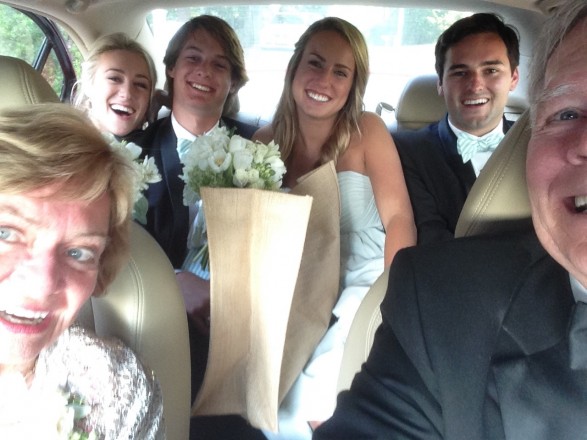

































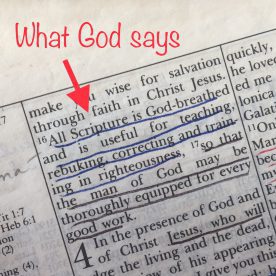



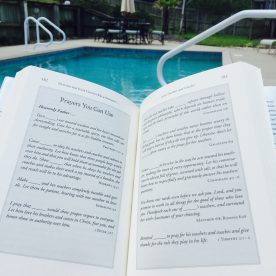
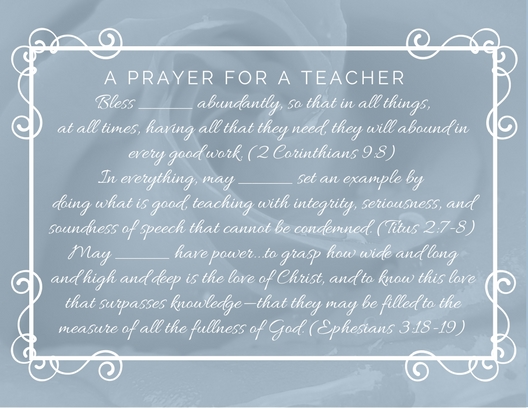

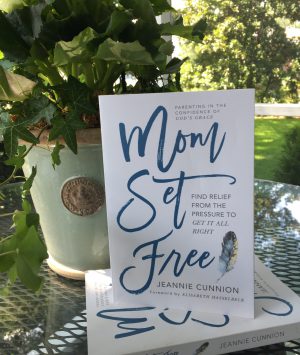




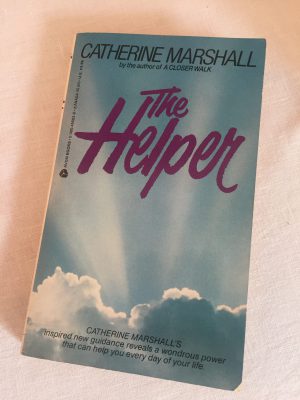

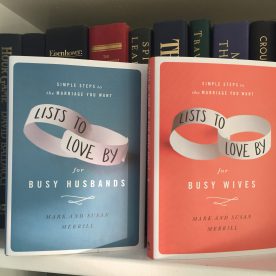

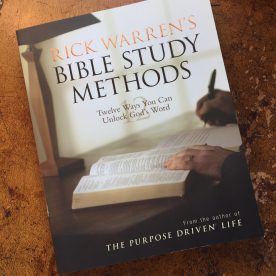


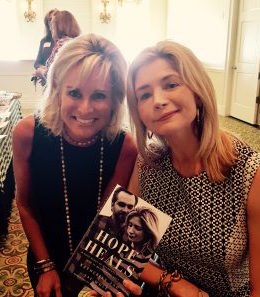

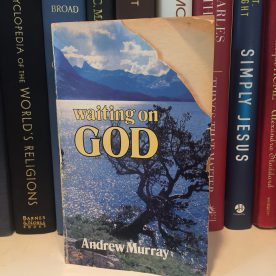
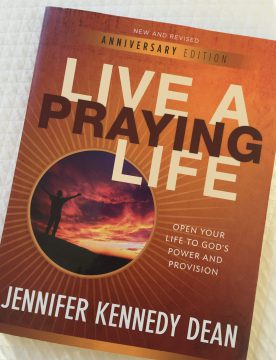

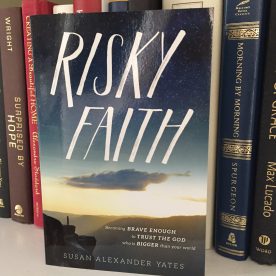

 Looking for a good read this summer? Granted, this is not your typical beach book (no bodices get ripped, there are no steely-eyed men, and I’m pretty sure nothing gets hijacked or explodes), but The Christian’s Secret of a Happy Life is a classic and, if you’ve not yet explored it, put it on your list.
Looking for a good read this summer? Granted, this is not your typical beach book (no bodices get ripped, there are no steely-eyed men, and I’m pretty sure nothing gets hijacked or explodes), but The Christian’s Secret of a Happy Life is a classic and, if you’ve not yet explored it, put it on your list.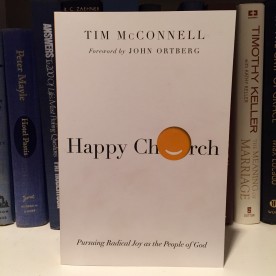
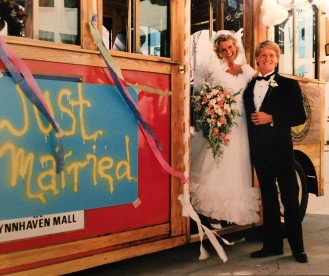


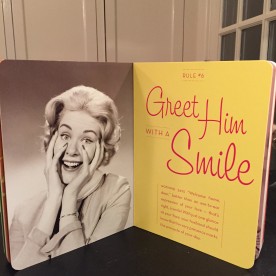




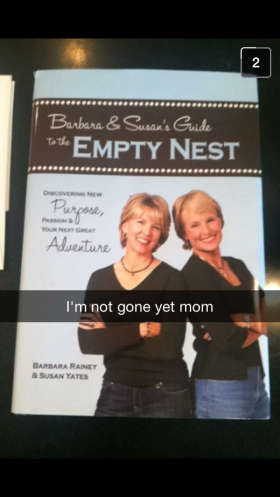

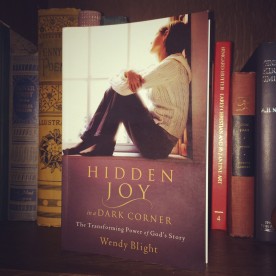


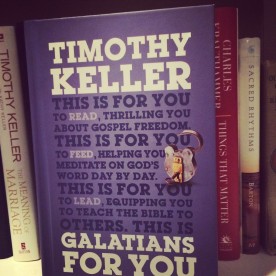
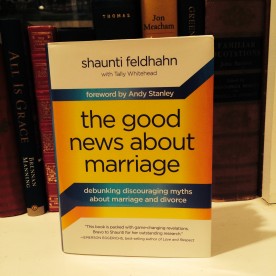
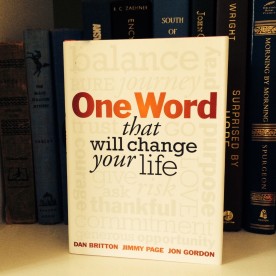

 One of my new-old favs is Catherine Marshall’s Beyond Our Selves. I first read it as a teenager; I rediscovered it this year. The bad news is that this 1961 book is out of print. The good news is that you can get copies on Amazon for as little as a penny!
One of my new-old favs is Catherine Marshall’s Beyond Our Selves. I first read it as a teenager; I rediscovered it this year. The bad news is that this 1961 book is out of print. The good news is that you can get copies on Amazon for as little as a penny! Hey Downton Abbey fans! Were you sad when Sybil died? Bummed to see Matthew crash his roadster and make Lady Mary a widow? Confused about why, when we’ve said goodbye to so many stellar characters, we still have to put up with poor Edith each week?
Hey Downton Abbey fans! Were you sad when Sybil died? Bummed to see Matthew crash his roadster and make Lady Mary a widow? Confused about why, when we’ve said goodbye to so many stellar characters, we still have to put up with poor Edith each week?













